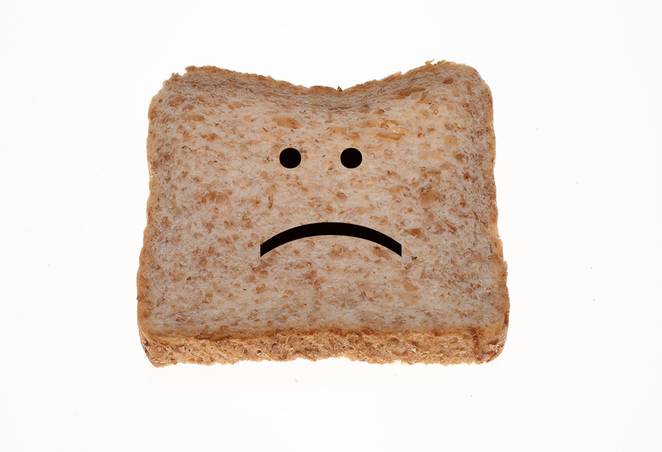- Home
- Editorial
- News
- Practice Guidelines
- Anesthesiology Guidelines
- Cancer Guidelines
- Cardiac Sciences Guidelines
- Critical Care Guidelines
- Dentistry Guidelines
- Dermatology Guidelines
- Diabetes and Endo Guidelines
- Diagnostics Guidelines
- ENT Guidelines
- Featured Practice Guidelines
- Gastroenterology Guidelines
- Geriatrics Guidelines
- Medicine Guidelines
- Nephrology Guidelines
- Neurosciences Guidelines
- Obs and Gynae Guidelines
- Ophthalmology Guidelines
- Orthopaedics Guidelines
- Paediatrics Guidelines
- Psychiatry Guidelines
- Pulmonology Guidelines
- Radiology Guidelines
- Surgery Guidelines
- Urology Guidelines
Panic after CSE report say Bread contains cancer-causing chemicals

New Delhi: Bread samples in Delhi contained cancer-causing chemicals, a study released today said, prompting the Union Health Ministry to order a probe.
Nearly 84 percent of 38 commonly available brands of pre- packaged breads including pav and buns, tested positive for potassium bromate and potassium iodate, banned in many countries as they are listed as "hazardous" for public health, the report by Centre for Science and Environment (CSE) said .
It claimed that while one of the chemicals is a category 2B carcinogen (possibly carcinogenic to humans), the other could trigger thyroid disorders but India has not ban their use.
CSEs Pollution Monitoring Laboratory (PML) tested 38 commonly available branded varieties of pre-packaged breads, pav and buns, ready-to-eat burger bread and ready-to-eat pizza breads of popular fast food outlets from Delhi.
"We found 84 per cent samples positive with potassium bromate or iodate. We re-confirmed the presence of potassium bromate or iodate in a few samples through an external third-party laboratory. We checked labels and talked to industry and scientists.
"Our study confirms the widespread use of potassium bromate or iodate as well as presence of bromate or iodate residues in the final product," said Chandra Bhushan, deputy director general, CSE.
Reacting to the CSE report, Health Minister J P Nadda said,"We are seized of the matter. I have told my officials to report to me on an urgent basis. There is no need to panic. Very soon we will come out with the (probe) report."
The study found that 84 per cent (32/38) samples were found with potassium bromate or iodate in the range of 1.15-22.54 parts per million (ppm).
Around 79 per cent (19/24) samples of packaged bread, all samples of white bread, pav, bun and ready-to-eat pizza bread and 75 per cent (3/4) samples of ready-to-eat burger bread were positive.
CSE said, "High levels of potassium bromate/iodate were found in sandwich bread, pav, bun and white bread" involving virtually all top brands.
CSE has urged food regulator FSSAI to ban the use of potassium bromate and potassium iodate with immediate effect and prevent their routine exposure to Indian population. PTI TDS PYK VMN VMN
Nearly 84 percent of 38 commonly available brands of pre- packaged breads including pav and buns, tested positive for potassium bromate and potassium iodate, banned in many countries as they are listed as "hazardous" for public health, the report by Centre for Science and Environment (CSE) said .
It claimed that while one of the chemicals is a category 2B carcinogen (possibly carcinogenic to humans), the other could trigger thyroid disorders but India has not ban their use.
CSEs Pollution Monitoring Laboratory (PML) tested 38 commonly available branded varieties of pre-packaged breads, pav and buns, ready-to-eat burger bread and ready-to-eat pizza breads of popular fast food outlets from Delhi.
"We found 84 per cent samples positive with potassium bromate or iodate. We re-confirmed the presence of potassium bromate or iodate in a few samples through an external third-party laboratory. We checked labels and talked to industry and scientists.
"Our study confirms the widespread use of potassium bromate or iodate as well as presence of bromate or iodate residues in the final product," said Chandra Bhushan, deputy director general, CSE.
Reacting to the CSE report, Health Minister J P Nadda said,"We are seized of the matter. I have told my officials to report to me on an urgent basis. There is no need to panic. Very soon we will come out with the (probe) report."
The study found that 84 per cent (32/38) samples were found with potassium bromate or iodate in the range of 1.15-22.54 parts per million (ppm).
Around 79 per cent (19/24) samples of packaged bread, all samples of white bread, pav, bun and ready-to-eat pizza bread and 75 per cent (3/4) samples of ready-to-eat burger bread were positive.
CSE said, "High levels of potassium bromate/iodate were found in sandwich bread, pav, bun and white bread" involving virtually all top brands.
CSE has urged food regulator FSSAI to ban the use of potassium bromate and potassium iodate with immediate effect and prevent their routine exposure to Indian population. PTI TDS PYK VMN VMN
breadbread causes cancercancerCentre for Science and EnvironmentFSSAIJP Naddapotassium bromatepotassium iodate
Source : PTINext Story
NO DATA FOUND

Disclaimer: This site is primarily intended for healthcare professionals. Any content/information on this website does not replace the advice of medical and/or health professionals and should not be construed as medical/diagnostic advice/endorsement or prescription. Use of this site is subject to our terms of use, privacy policy, advertisement policy. © 2020 Minerva Medical Treatment Pvt Ltd